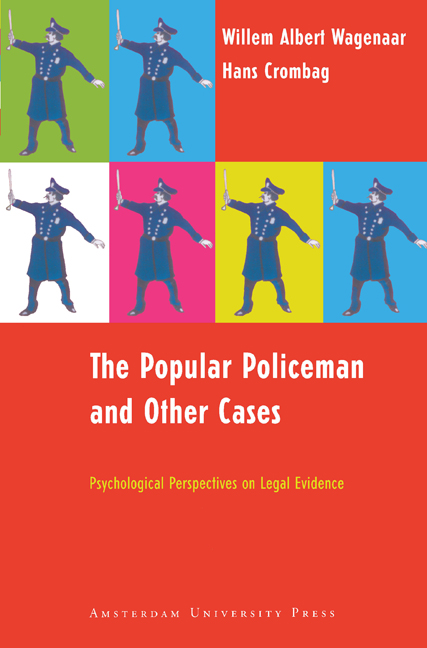Book contents
- Frontmatter
- Contents
- Foreword
- 1 Illegal Gambling or the Victory Travel Club
- 2 On Causal Reasoning or Death in the Warmoesstraat
- 3 Consumer Confusion or Potato Chips and Olive Oil
- 4 Fiction and Reality of ‘the Average Individual’ or the Case of Old Mr. Lane
- 5 Case Histories and Scientific Proof or the Case of JR
- 6 Not a Good Story or the Disappearance of Maddy and Vicky
- 7 Conflicting Scenarios or the Case of the Man who Needed a Companion
- 8 Two Processes Obstructing the Accuracy of Long-Term Memory or the Case of the Stolen Mercedes
- 9 Confessions after Repeated Interrogation or the Putten Murder Case
- 10 Collaborative Storytelling or the Artist’s Models and an Angry Neighbourhood
- 11 Allegation of Sexual Child Abuse in a Case of Disputed Visitation or Cindy's Story
- 12 Psychogenic Amnesia or the Case of the Amnesic Strangler
- 13 Obeying Reflexes or Death on the Climbing Wall
- 14 Visual Acuity or Shooting Mimi the Cat
- 15 Sexual Semiotics or the Case of the Popular Policeman
- Postscript: Psychological Expertise and the Law
- Bibliography
- Name Index
- Subject Index
4 - Fiction and Reality of ‘the Average Individual’ or the Case of Old Mr. Lane
Published online by Cambridge University Press: 16 February 2021
- Frontmatter
- Contents
- Foreword
- 1 Illegal Gambling or the Victory Travel Club
- 2 On Causal Reasoning or Death in the Warmoesstraat
- 3 Consumer Confusion or Potato Chips and Olive Oil
- 4 Fiction and Reality of ‘the Average Individual’ or the Case of Old Mr. Lane
- 5 Case Histories and Scientific Proof or the Case of JR
- 6 Not a Good Story or the Disappearance of Maddy and Vicky
- 7 Conflicting Scenarios or the Case of the Man who Needed a Companion
- 8 Two Processes Obstructing the Accuracy of Long-Term Memory or the Case of the Stolen Mercedes
- 9 Confessions after Repeated Interrogation or the Putten Murder Case
- 10 Collaborative Storytelling or the Artist’s Models and an Angry Neighbourhood
- 11 Allegation of Sexual Child Abuse in a Case of Disputed Visitation or Cindy's Story
- 12 Psychogenic Amnesia or the Case of the Amnesic Strangler
- 13 Obeying Reflexes or Death on the Climbing Wall
- 14 Visual Acuity or Shooting Mimi the Cat
- 15 Sexual Semiotics or the Case of the Popular Policeman
- Postscript: Psychological Expertise and the Law
- Bibliography
- Name Index
- Subject Index
Summary
Much of what the expert psychologist can tell a judge or a jury is related to research outcomes averaged over many individual subjects. There is even a tendency to value empirical evidence proportional to the number of subjects involved, and to disregard data based on few subjects, particularly evidence from single-subject designs. The rationale of using many subjects is, of course, that the outcome becomes less sensitive to the idiosyncrasies of one or a few participants in a small sample. Thus, the reliability of the results obtained in large samples is enhanced, which is the likelihood that other investigators repeating the study will obtain the same outcome. But the validity of the average for application to an individual case is less dependent upon the sample size than on the distance of that particular individual from the average.
Lawyers seem to be aware of this problem. It is not unusual for experts to be confronted with the question: ‘This is all very well as far as your average subject is concerned, but how do you know that Mr. or Mrs. X (the witness, the suspect, or any other person under discussion) does not differ significantly from the group mean?’ And what about the following question: ‘Did you test the vision (or memory, or any other relevant aptitude or characteristic) of Mr. or Mrs. X?’ The answer to the latter question is almost always negative because expert psychologists usually do not, and may not even be allowed to run tests on individuals featuring in a trial. A case in point is the identification of a suspect through recognition of their appearance. An identification expert is almost never allowed to test the vision or memory of the witnesses, particularly not if these witnesses are police officers. Another example is the reliability of the accuser in a sexual abuse case. Even though we know that in this type of case false accusations are by no means rare (cf. chapter 11), experts on issues of memory, who are often consulted in such cases, are seldom allowed to test the memory of the individual bringing such a charge.
- Type
- Chapter
- Information
- The Popular Policeman and Other CasesPsychological Perspectives on Legal Evidence, pp. 57 - 70Publisher: Amsterdam University PressPrint publication year: 2012



